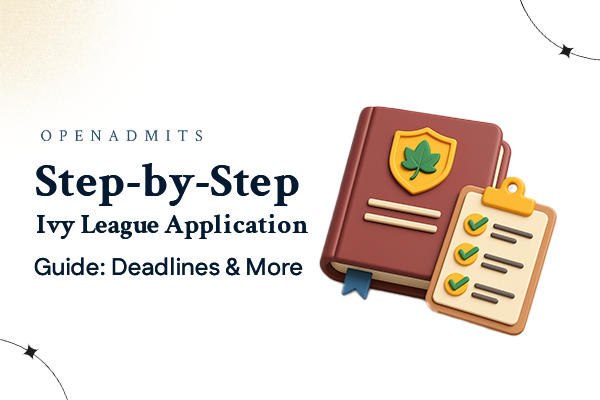Step-by-Step Ivy League Application Guide: Deadlines & More
Harriny • 19th May, 2025
Threatens to slash another $1 billion in Harvard funding? This political drama is shaking up the academic world, and if you're aiming for the Ivies, it's time to pay attention.
Source: The Economic Times
It just means the game is getting more competitive and political. So if you're eyeing that Harvard, Yale, or Princeton badge, your Ivy League application needs to be sharper, smarter, and way more strategic.
Let’s break down exactly how to do that, step by step.
**📮 **Schedule your **FREE call with **us
Step 1: Stats Matter But They’re Not Everything
Sure, strong academics are a given at this level. Top Ivy League schools expect stellar grades, rigorous coursework, and if applicable impressive SAT or ACT scores. But when two applicants have near-identical numbers, that alone rarely tips the scale.
Forbes rightly points out that a fractional difference in scores or GPA is unlikely to decide the outcome. Context is crucial. Did the student challenge themselves with the hardest courses offered at their school?
Admissions officers don’t punish applicants for what they didn’t have access to. If a school doesn’t offer APs or IB, what matters is how a student used the academic tools they did have access to.
If a student goes out of their way to take community college classes or online advanced courses, that initiative often reflects a level of intellectual drive.
Know Your Ivy League application Deadlines
Timing is crucial when it comes to your Ivy League Application. Missing a deadline can be the difference between getting your foot in the door and being left out in the cold. Make sure to stay ahead of the game by keeping track of the major deadlines for each Ivy League school you’re applying to.
While specific dates can vary by school, here’s a general guide for most Ivy League institutions:
- Early Decision (ED) : Typically due by November 1st.
- Regular Decision (RD): Usually due by January 1st.
Make sure to double-check each university’s website for updates and specific submission details.
If you’re dead-set on one Ivy (like Columbia or Dartmouth), ED could boost your shot. But it’s binding. Be sure. Don’t play by yourself.
1. Early Decision (ED)
- Binding? Yes
- Other Early Applications Allowed? No
- Used By: Brown, Columbia, Cornell, Dartmouth, Penn
- Decision Timeline: Mid-December
2. Restrictive Early Action (REA)
- Binding? No
- Other Early Applications Allowed? No (except to public universities)
- Used By: Harvard, Princeton, Yale
- Decision Timeline: Mid-December
3. Regular Decision (RD)
- Binding? No
- Other Early Applications Allowed? Yes
- Used By: All Ivy League universities
- Decision Timeline: Late March / Early April
Step 2: Stop Comparing Individual Cases
Instead of zeroing in on why Student A got into Harvard while Student B didn’t, looking at broader class-wide data. Patterns matter more than one-off success stories.
Compare your stats to the averages of an entire admitted class, not to random success stories.
Step 3: Crafting the Perfect Ivy League Application Essay
Now, let’s talk about one of the most critical parts of your Ivy League Application—the essay. This is your chance to show the admissions committee who you really are, beyond grades and test scores. The essay should reflect your personality, your passions, and your unique perspective.
[Forbes] notes that admissions officers are looking for essays that are authentic and well-thought-out. This is not the time to try to write what you think they want to hear. Be honest, and focus on telling your personal story in a way that highlights your growth, challenges, and future potential.
Extracurriculars
Every year, high school forums are overwhelmed with questions like: “Should my child do Model UN or robotics to get into Ivy?”
Ivy admissions teams aren’t hunting for specific activities. What they’re seeking is commitment. A consistent pursuit over time. Leadership. Originality. Passion.
As Dartmouth alum Kennedy Hamblen puts it: Admissions officers would rather see deep involvement in a few meaningful activities than a long, scattershot list meant to impress.
Step 4: Navigating the Interview Process
Some Ivy League schools will require or offer interviews as part of their Ivy League Application process. This is your chance to make a personal connection with the admissions team, and it’s important to treat it seriously.
Not just about answering questions. It’s about showing who you are beyond your application. Be prepared to discuss your interests, your academic passions, and your future goals. The more genuine you are, the more likely you are to leave a lasting impression.
Holistic Admissions = Big Picture Thinking
Ivy League schools evaluate applications holistically. Meaning, they consider the whole student, not just test scores or a shiny resume.
Grades, essays, recommendation letters, and even a student’s environment are all taken into account. Did the student make the most of the opportunities available to them? That speaks volume.
For instance: Yale Admissions directly assess each student within the context of their circumstances, not against a rigid checklist.
The Real Ivy Secret? Vision + Fit
Adcom is trying to understand something applicants rarely see: How will this person shape our campus community? How will they contribute over four years and far beyond?
Sometimes, a student who seems perfect “on paper” isn’t the best fit for a particular campus culture or department focus. Next time someone wonders why one student made it in and another didn’t, remember this: Ivy League admissions are more than algorithms.
Yes, statistics count. But character, context, and curiosity? They weigh more.
Spend your Ivy League energy with Einstein way:
● Application Planning
● AI-Enhanced + Human Expertise – A hybrid model combining technology with personal mentorship
● Mentorship from Ivy Insiders
**📮 **Schedule your **FREE call with **us
← Return home